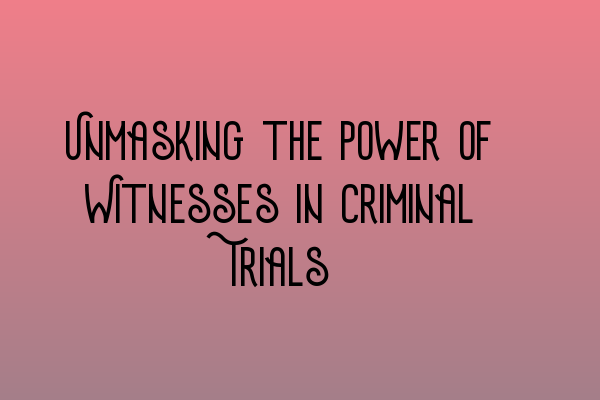Unmasking the Power of Witnesses in Criminal Trials
When it comes to criminal trials, witnesses play a crucial role in determining the outcome of the case. Their testimonies can provide valuable insights, establish facts, and present evidence that helps the jury or judge make an informed decision. In this blog post, we will explore the significance of witnesses in criminal trials and how their testimony can make or break a case.
The Role of Witnesses
Witnesses are individuals who have firsthand knowledge or information relevant to the criminal offense being tried. They can include victims, bystanders, law enforcement officials, and even experts in certain fields. Their primary duty is to provide truthful and accurate testimony that sheds light on the events surrounding the alleged crime.
Witnesses bring credibility to a case. Their presence in the courtroom shows that there is more than just the words of the prosecution or defense. They serve as the eyes and ears of justice, providing an unbiased account of what they saw, heard, or experienced.
Witness testimony can take various forms, such as oral statements or written affidavits. Both types can be presented in court, and it is up to the judge or jury to evaluate their credibility and relevance to the case.
The Power of Witness Testimony
The testimony of witnesses can be a powerful tool for both the prosecution and the defense. It can establish a timeline of events, corroborate or rebut other evidence, and provide insight into the motive, intent, or state of mind of the defendant.
For the prosecution, witnesses can help establish the elements of the crime. Their testimony can provide crucial details about the defendant’s actions, whereabouts, and involvement in the alleged offense. This can significantly strengthen the prosecution’s case and increase the likelihood of a guilty verdict.
On the other hand, witnesses called by the defense can challenge the prosecution’s version of events. Their testimony can raise doubts about the reliability and accuracy of the prosecution’s evidence. By presenting an alternative narrative, witnesses can create reasonable doubt in the minds of the judge or jury, potentially leading to an acquittal or a lesser conviction.
It is important to note that not all witnesses are created equal. Some witnesses may have a stronger impact on the case due to their relationship to the defendant, their expertise in a relevant field, or their ability to provide compelling and credible testimony. It is the role of the legal teams to carefully select and prepare witnesses to maximize their persuasive power.
The Challenges of Witness Testimony
While witness testimony can be powerful, it is not without its challenges. Witnesses may face intimidation, pressure, or fear that affects their willingness to testify or their ability to provide accurate accounts of events. In some cases, witnesses may even recant or change their statements, complicating the trial process.
Cross-examination is another significant challenge in criminal trials. The defense has the right to question witnesses and challenge their credibility, memory, or biases. Skilled defense attorneys may attempt to discredit witness testimony by highlighting inconsistencies, contradictions, or ulterior motives.
It is essential for legal professionals to thoroughly investigate and prepare witnesses to withstand cross-examination effectively. This includes gathering evidence, reviewing statements, and ensuring that witnesses are well-prepared to provide coherent and consistent testimony.
Conclusion
Witnesses are the backbone of criminal trials. Their testimonies hold the power to influence the outcome of a case. Whether they support the prosecution’s version of events or provide a different perspective, witnesses play a critical role in uncovering the truth and ensuring that justice is served.
To enhance your understanding of legal concepts and further explore the world of law, we recommend reading these related articles:
